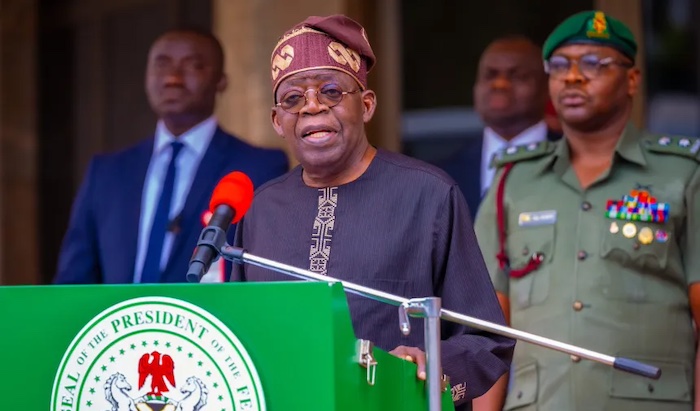Again, Tinubu Defends Fuel Subsidy Removal, Pledges Infrastructure Growth Amid Economic Reforms
President Bola Tinubu on Tuesday, reiterated that though painful in the short term, the removal of fuel subsidy was designed to free up budgetary resources for critical investments in infrastructure and social services.
The President also disclosed that his administration has taken courageous steps to reform Nigeria’s macroeconomic environment, with a focus on restoring confidence in the nation’s economy.
This, he said, the federal government was rigorously working to actualise through measures targeted at reducing inflation, stabilising the foreign exchange market and improving fiscal management.
This was as the Chairman of the United Bank for Africa (UBA) Group, Mr. Tony Elumelu, noted that while the Nigerian banking sector was a cornerstone of the nation’s economy, it remains confronted with challenges such as regulatory burdens and high compliance costs, which impede growth and innovation.
The President and Elumelu spoke at the 17th Annual Chartered Institute of Bankers of Nigeria (CIBN) Banking and Finance Conference held in Abuja, Speaking while declaring the conference open, Tinubu, who was represented at the event by Vice President Kashim Shettima, explained steps being taken to restore confidence in the nation’s economy, saying, “We have taken bold steps to reform the macroeconomic environment. Our focus is on restoring confidence in the Nigerian economy through measures aimed at reducing inflation, stabilising the foreign exchange market, and improving fiscal management.
“Though painful in the short term, the removal of fuel subsidies is designed to free up budgetary resources for critical investments in infrastructure and social services, frequent adjustment of the monetary policy rate, a move aimed at curbing inflation and fostering a more market-oriented exchange rate system.”
He described this year’s theme for the CIBN Conference, “Accelerating Economic Growth and Development: The State of Play and the Way Forward,” as both timely and imperative, noting that it came at a time the nation was grappling with interrelated challenges.
Listing the challenges to include high inflation, rising costs of living, unemployment, infrastructure deficits and effects of global economic shifts, the President observed however that the challenges also present opportunities for growth and development.
According to him: “This theme will enable us to evaluate where we stand as a nation, understand the root causes of our economic challenges, and explore actionable strategies to accelerate growth and development sustainably and inclusively.”
Tinubu also noted that his administration was committed to strengthening infrastructure development in the ongoing bid to grow Nigeria’s economy.
“We are committed to upgrading Nigeria’s infrastructure to support economic growth. We are investing in roads, railways, and energy projects through public-private partnerships to reduce transportation costs and improve market access,” he said.
The President further explained why the administration was prioritising the digital economy, which he said will drive innovation and enhance financial inclusion.
He added: “We are expanding broadband penetration and encouraging the growth of tech startups through initiatives such as the Digital Nigeria program. For example, we currently train three million Nigerian youths in digital technology and essential skills and then deploy them to innovation hubs.
“These efforts are designed to create jobs, increase productivity, and make financial services more accessible to Nigerians in all corners of the country. “It is essential to state that we are committed to achieving a 70 percent digital literacy level by 2027 through innovative approaches in delivering initiatives, continuous collaborations and stakeholder engagement.”
On the way forward, Tinubu called for collaboration across all sectors, including the government, private industry, and civil society organisations, saying, “to achieve sustained economic growth, we must intentionally align our policies and actions with the changing global landscape.
“The government is committed to implementing reforms to enhance macroeconomic stability, reduce inflation, and support infrastructure development”.
President Tinubu expressed hope that the conference will provide a platform for the sharing of ideas, exchange of knowledge, and exploration of innovative solutions to the challenges bedevilling the country.
“The conversations during this event will allow us to dissect the critical problems affecting our financial system and economy, identify growth opportunities, and collectively shape the future of banking and finance in Nigeria,” he added.
In his contribution, Elumelu, who is also the Chairman of Heirs Holdings, noted that to overcome challenges in the banking sector, collaboration between government agencies, regulatory bodies, and banking institutions was essential.
According to the founder of the Tony Elumelu Foundation, by working together, they could strengthen the sector, ensuring it continues to drive economic growth within Nigeria and extend its influence across Africa and beyond.
Also, Group Managing Director/Chief Executive Officer of UBA Plc, Oliver Alawuba, who doubles as Chairman of the Body of Banks’ CEOs and Chairman of the 17th CIBN Annual Banking and Finance Consultative Committee, praised the Governor of the Central Bank of Nigeria, Mr. Olayemi Cardoso, for the significant progress in restoring investor confidence, promoting price stability, and implementing key reforms in the banking industry.
Delivering his keynote address, the UBA boss said: “Our banking sector is a cornerstone of Nigeria’s economy. The transformation of our banking sector over the last few decades is one of our success stories.
“The sector employs millions, provides crucial financial support to countless businesses, and generates income for millions of shareholders. However, the sector faces challenges that impede its growth and innovation, including regulatory and high compliance costs.
“To overcome these challenges, stakeholders—including government agencies, regulatory bodies, and banking institutions—must engage in constructive dialogue to foster a collaborative environment.
“By working together, we can build a more resilient banking sector that drives economic growth and supports the aspirations of Nigerians.
“The success of Nigerian banking sector is felt beyond Nigeria. Nigerian banks have become multinationals, leading the sector across Africa, establishing themselves in the world’s financial capitals – and in doing so they have changed how our country is perceived, created pathways to opportunity and set themselves up as role models for our other industries.”
Deji Elumoye and Nume Ekeghe
Follow us on:







